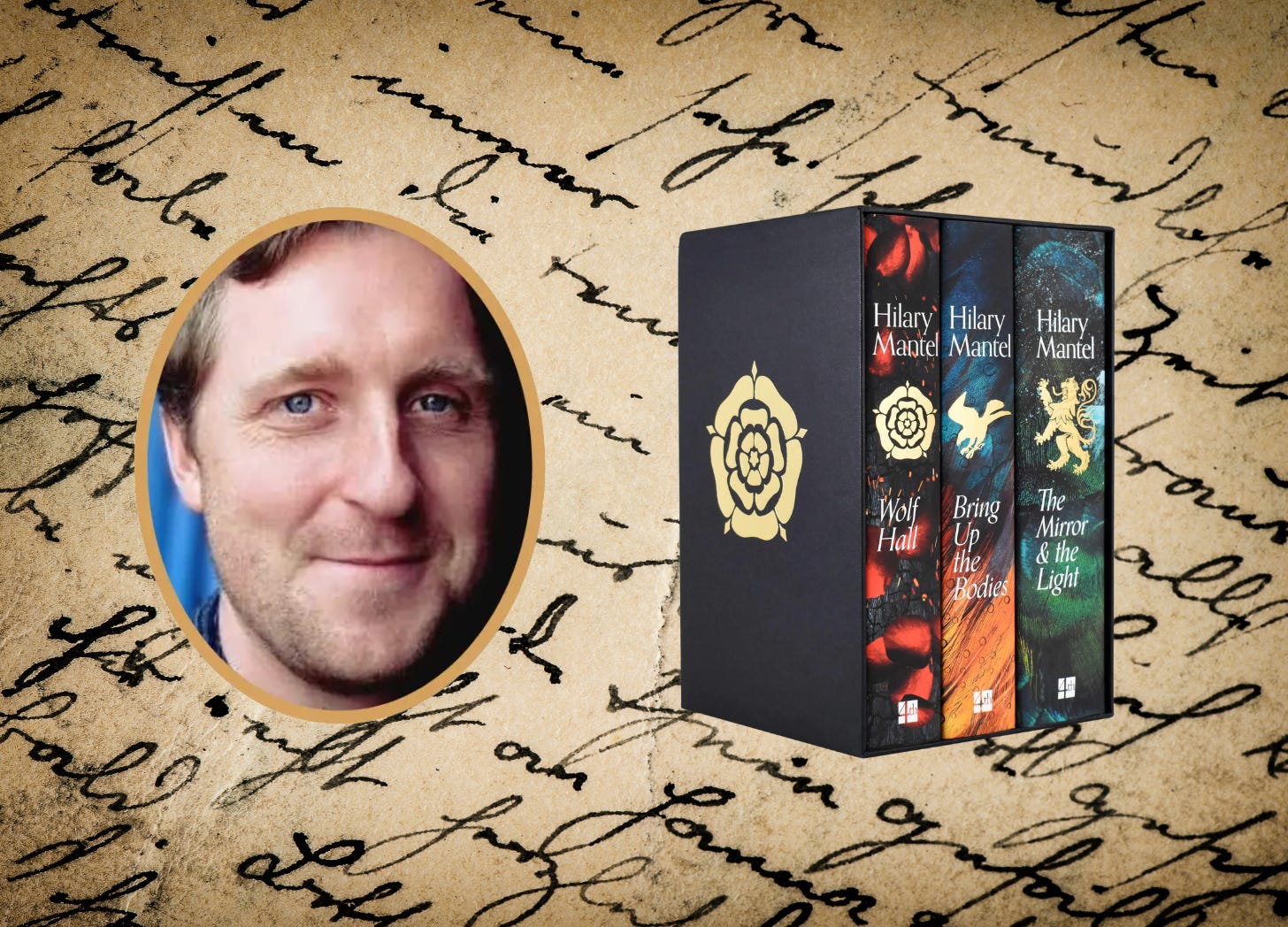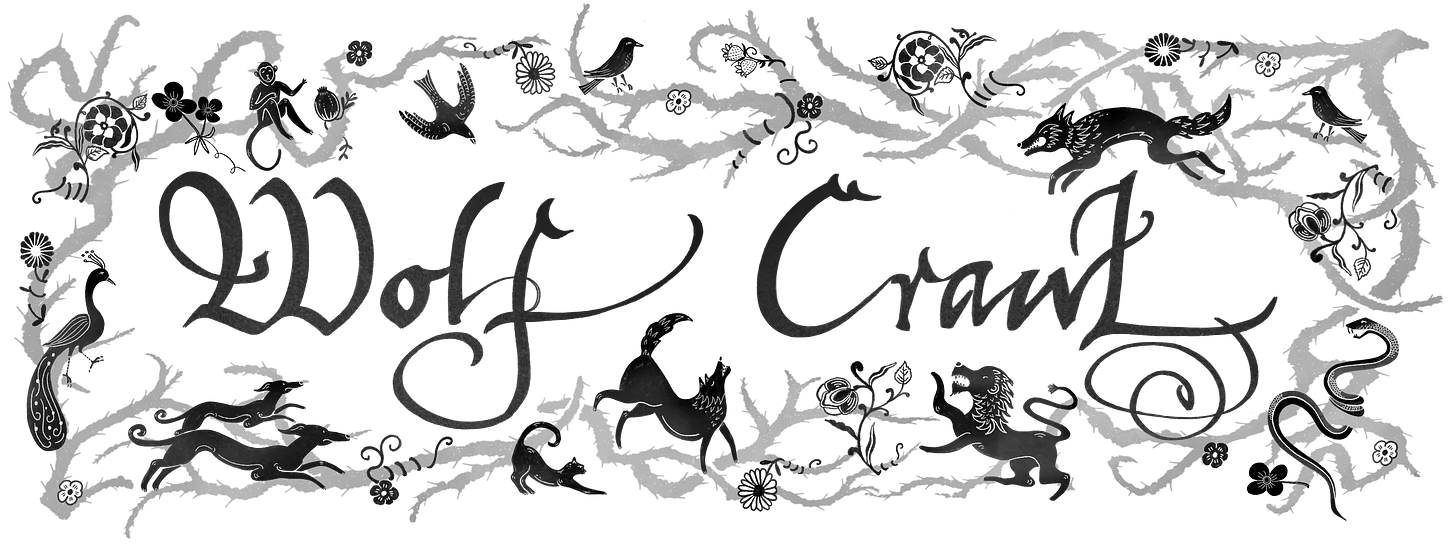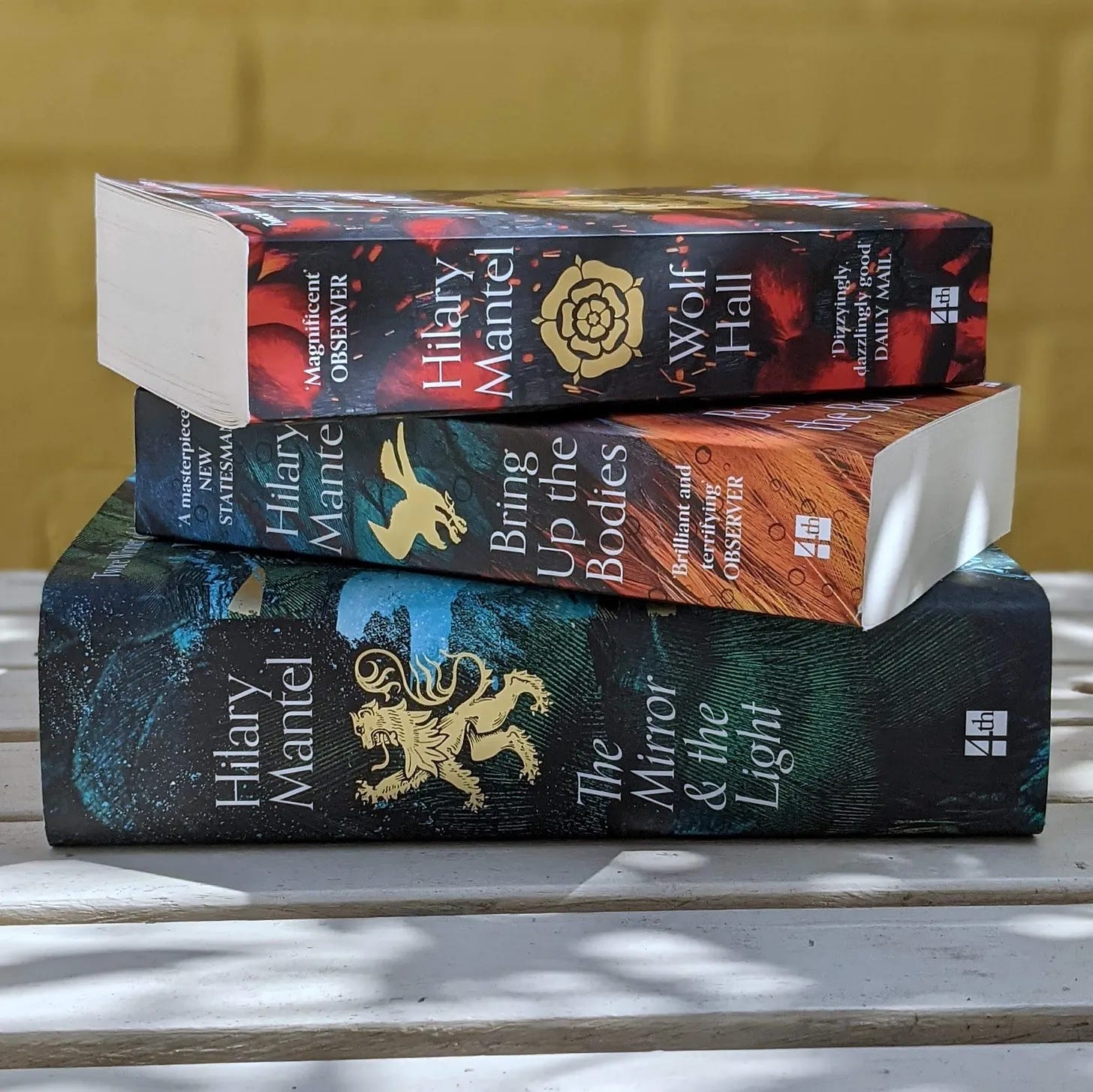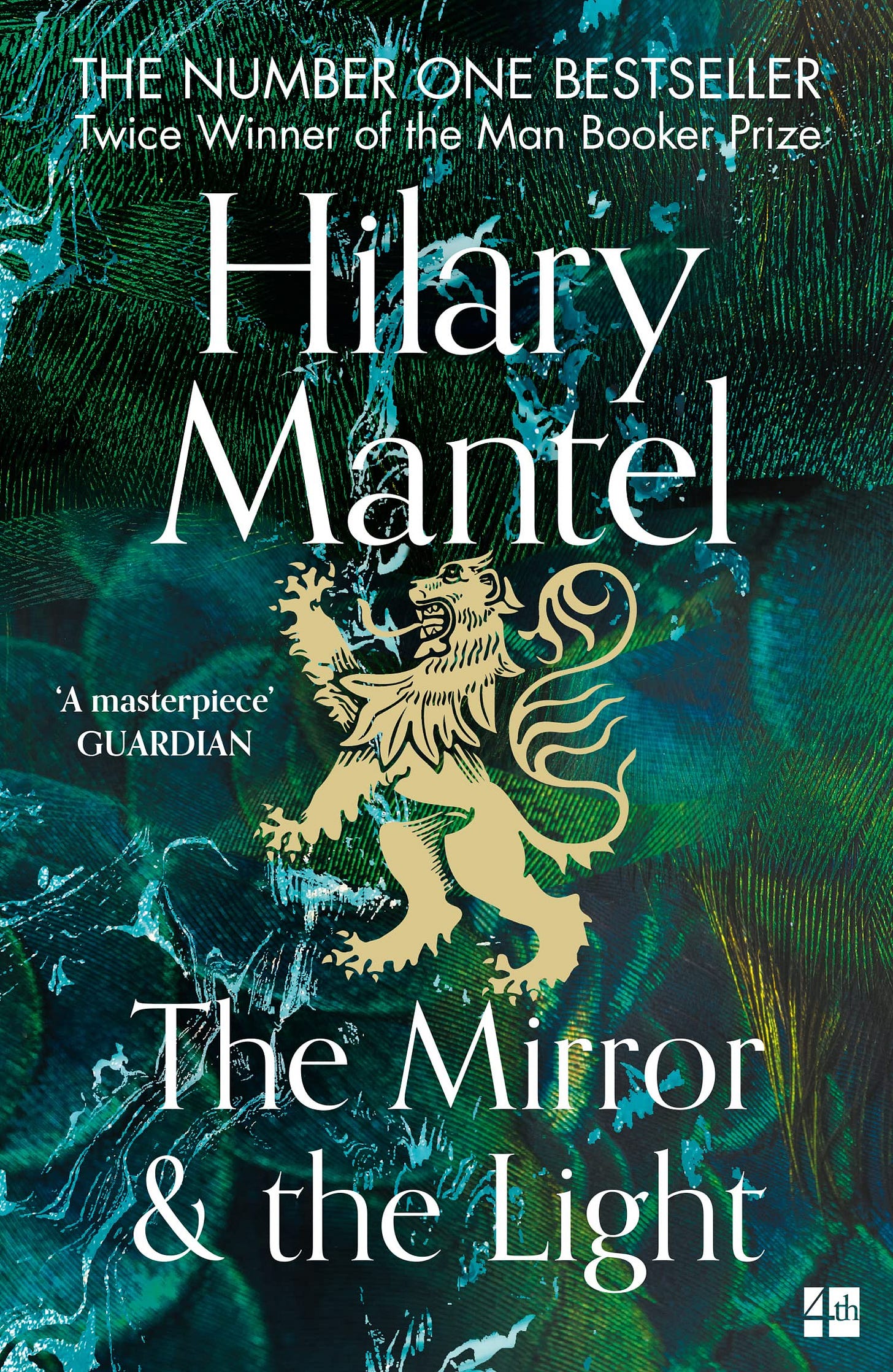Q&A with Simon Haisell from Footnotes & Tangents
On Slow Reading the Magnificence of Hilary Mantel
1. What inspired you to begin a ‘slow-read’ of Hilary Mantel’s Cromwell Trilogy—and what do you think readers gain from approaching the books this way, especially The Mirror and the Light?
Back in 2023, I hosted a year-long read-along of Leo Tolstoy’s War and Peace. We read a chapter a day for a whole year, and the experience was a revelation. Not only were we living the story from day to day, and noticing far more than we might otherwise, but we were also creating a community of readers.
It was a deeply rewarding and fulfilling experience – and for many, it was even meditative and healing, an alternative to doomscrolling and an antidote to our hurried age.
So I wondered what would happen if we gave Hilary Mantel’s magnificent trilogy the same treatment. And what better tribute to her memory and work than to spend a whole year immersed in her writing in the company of others who value her books.
One of our readers came up with the name, and Wolf Crawl stuck. I published a reading schedule followed by weekly discussion posts. Several hundred Wolf Crawlers joined us for 2024. The reading was so rich and the response so positive that I knew we had to repeat the read-along this year. I updated the material, released it as a podcast and collaborated with an illustrator and map maker, as well as Wolf Hall Weekend’s very own Lucie Bea Dutton, who brings additional archival material to the posts.
It is a wonderfully indulgent way to read Hilary Mantel. Each week, we pore over an abundance of historical detail, classical allusions, themes, ideas, and language. And with hundreds of eyes on the page, there’s always something fresh to glean from the contributions and discussion.
On 23 July, we begin the final leg of our journey and turn the first page of The Mirror and the Light. Here, the slow group read comes into its own. The Mirror and the Light is not a book to be rushed. It is slow, reflective, haunting and haunted. Many readers say they have put off reading it out of fear of the end. The Wolf Crawl community has become a way of seeing things through to their conclusion and saying farewell to Thomas Cromwell in good company.
2. Many readers find the final novel in the trilogy slower and more introspective than the first two. How does a slow-read approach transform these supposed weaknesses into an appreciation for the book’s greatest literary strengths?
The Mirror and the Light is a challenge. At almost 900 pages, it is significantly longer than its predecessors, and its structure is more complex. Wolf Hall and Bring Up the Bodies have a straightforward narrative arc, following the rise and fall of Anne Boleyn, and the rise and rise of Master Secretary.
In contrast, The Mirror and the Light must contend with four years of political statecraft, from a popular rebellion to an alleged conspiracy, the tragic death of one queen and the calamitous search for her replacement.
Hilary Mantel’s advice to readers is to take your time and read each of the book’s six parts as a novel within a novel. If history is “one damn thing after another”, resist the urge to race ahead to the next moment of crisis, and dwell instead in Cromwell’s ever-changing present. We have seen the making of the man; now we are living his undoing, one day at a time.
The River Thames flows through these books. It’s on the cover of The Mirror and the Light, and on the novel’s last page. The final stage of Cromwell’s story is like the last slow stretch of the river, reaching its full magnificence before it joins the sea and is gone. The Thames is tidal, and Cromwell’s onward momentum is stalled by some hidden force, a lunar pull that ebbs and flows, dredging up old memories that take on a new aspect. A slow read of The Mirror and the Light finds us mudlarking through Cromwell’s past, sifting for the sense of him before he is gone.
3. Your footnotes and tangents often illuminate surprising historical detail and literary nuance. How do you balance the factual and fictional worlds in your commentary—and what has surprised you most in the process?
Hilary Mantel is our guide here. In her BBC Reith Lectures, she set out her stall: the historical novel does not offer a “replica” of the past but a “painting with the brush strokes left in”:
"To the historian, the reader says, “Take this document, object, person – tell me what it means.” To the novelist he says, “Now tell me what else it means.”"
Wolf Hall is a work of imagination based on detailed research. But the historical record is partial, in both senses: “facts are not truth” and “history is not the past.” We ask a historian for the facts, but we ask the novelist to bring the past to life.
My posts have plenty of historical footnotes, but my commentary focuses on Mantel’s fictional Thomas Cromwell. I am interested in how Mantel constructs the story from Cromwell’s very particular point of view. I’m less bothered about Mantel’s historical accuracy (impressive though it is) than with the cohesive complexity of her vision.
However, the biggest surprise emerged from a fresh revelation after the books were published: the discovery of Cromwell’s Book of Hours by Dr Owen Emmerson and colleagues, and its identification as the book in Hans Holbein’s portrait.
The discovery renders a scene in Wolf Hall factually inaccurate. Hans Holbein rejects Cromwell’s Bible as “too plain, too thumbed,” so Master Secretary scours his house for “the finest volume he owned.” Mantel decides the mysterious book in the painting is Luca Pacioli’s Summa de Arithmetica.
It is a significant choice for Cromwell’s self-image, who earlier in the novel said “all the poems” can be found in this book of accountancy because “anything that is precise is beautiful.” When Mantel inserts it into Holbein’s painting, she combines her themes on money and religion, deception and presentation, Cromwell’s love of books and his Italian connection.
But there’s a nice twist to the tale. In Bring Up the Bodies, he tells Henry Percy, “I have a book of accountancy that is often mistaken for a Bible.” “Especially by you,” quips the Earl of Northumberland. Unfortunately, Mantel did not live long enough to learn of the discovery of this Book of Hours. I think she would have taken special pleasure in how this new fact alters the way we read this exchange between Percy and Cromwell.
4. The Wolf Hall Trilogy explores Cromwell’s evolving self-perception—his memories, regrets, ambitions. How do you see The Mirror and the Light using language and structure to convey the fragmentation of his identity?
Wolf Hall is dripping with self-confidence and self-aggrandisement. Cromwell boasts about his prodigious memory and likes to dazzle English courtiers with the things he learned in Italy. But in Bring Up the Bodies, a story about mutable facts and flimsy evidence, he begins to doubt his knowledge of his past. His central role in the state murder of five men and one woman is the catalyst for the fragmentation of his self in The Mirror and the Light.
The very first chapter alerts us that something is up with the narrative. Mantel rewrites the final scene of Bring Up the Bodies, a key exchange between Cromwell and Thomas Wriothesley, in which Call-Me Risley repeats the dangerous rumour that Cromwell intends to punish his king for the fate of Cardinal Thomas Wolsey.
As the book progresses, we are repeatedly swept back into memories and events already described in the first two books. These revisions don’t contradict the original versions, so much as add new imagery and detail; for example, the scavenging dogs in the shadows at the burning of the Lollard Joan Boughton – a defining moment in Cromwell’s childhood.
The new details are unsettling. If Cromwell’s famed memory system was watertight, every journey into his past would be the same. Instead, his memories feel unsteady, a substratum of self shifting beneath him. As Cromwell thinks in May 1536: “We shall not escape these weeks. They recapitulate, always varied and always fresh, always doing and never done.”
Memories cascade into one another, so that the remembering of an ink blot on a death warrant becomes a portal into a much earlier event concerning the “eel boy”, whose fate marks Cromwell with his irremediable original sin. Throughout the book, a series of disquieting conversations present Cromwell with mirrors that distort his self-image. They “make him strange to himself.” They rewrite his story, as his interrogators will do in his last days in the Tower.
Meanwhile, life goes on. Two narratives run through The Mirror and the Light. Cromwell’s public persona, “Jolly Tom from Putney”, goes on rising and besting his opponents, until he doesn’t. But behind his arranged face, he grows less sure of who he is and what he’s doing. This conflict between inner and outer Cromwell shapes the story. If Thomas More and Anne Boleyn were the antagonists of books one and two, Cromwell’s greatest opponent in book three is himself.
5. Our theme for Wolf Hall Weekend 2026 is Magnificence. How do you interpret this idea within the context of The Mirror and the Light—especially as Cromwell’s own vision of grandeur collides with mortality and disillusionment?
The allegorical characters of John Skelton’s play Magnificence are listed in the epigraph to Wolf Hall. In this morality play, the prince Magnificence is ruined by evil counsellors and redeemed by good ones. The play is performed by Wolsey’s enemies before his downfall, and is reprised for Cromwell in 1540.
In The Mirror and the Light, who is Magnificence? This is a world where all grandeur begins and ends with the king. In his “Book Called Henry”, Cromwell advises himself to always flatter his king. He calls Henry “the mirror and the light of Christendom”, but he knows, and we know, that Henry is a monster. Yet Cromwell’s performance of courtly servility is so perfect that he almost convinces himself that he loves his king. The alternative would be fatal politically and spiritually. If Henry isn’t Magnificence, what does that make me? What am I doing with my life?
Long ago in Wolf Hall, Cromwell “picked his prince” and is now living with the consequences. He is also living with the result of appealing to both Henry’s best and worst qualities. In Skelton’s allegorical play, Cromwell is simultaneously the good and wicked counsellor, but Henry is less a Renaissance philosopher-king and more a bloody tyrant.
So at various points in the story, we catch Cromwell thinking and occasionally saying, “If I were king…” King Cromwell would do a far better job. Whether this is arrogance or honesty, hubris or supreme self-confidence, it is the dangerous desire that electrifies the story. Forget Henry, this is Cromwell’s magnificence. The Mirror and the Light charts his final ascent to the vertigo-inducing apex of his career. From blacksmith’s son to Earl of Essex: that’s a magnificent tale, is it not?
Whether out of curiosity or ambition or just to prove his father wrong, he intends to go on climbing. This book is full of stairs and ladders, and cats up trees. In the chapter “Magnificence”, Cromwell considers the Stairway to Heaven, St Bernard’s vision of souls ascending:
"It is easy to climb. Harder to know what to do when you get to the top. As we labour upwards, the Fiend shakes the foot; and treads can snap, or the whole structure sink in boggy ground."
In The Mirror and the Light, that boggy ground is Cromwell’s murky past and his complicity in Henry’s crimes. Is the grandeur and power worth it? And how can this magnificence last, when all of it depends on the will of the king?
But there is another magnificence. In the Tower, a condemned Cromwell thinks of the moment Icarus’ father, Daedalus, first flew:
"…there must have been an instant when the artificer knew, in his pulse and his bones, This is going to work. And that instant was worth the rest of his life."
Cromwell’s fall was probably inevitable, but Mantel makes us believe with her protagonist that there is always a way out. On each page of The Mirror and the Light, she evokes the stubborn insistence of the present to live and breathe and hope, despite its haunted past and foreshortened future.
Like Daedalus, Cromwell feels the thrill of his participation, his immersion in life. And in reading The Mirror and the Light, we feel it too, in our pulse and in our bones. This vital feeling serves as a counterpoint to Cromwell’s disillusionment and our own melancholy when confronted with our past and mortality. This feeling of living – of flying – is worth the rest of our lives.
And that really is magnificent.
6. You’ll be leading a panel discussion at the event with Dr Lucy Arnold, and the play adaptation of The Mirror and the Light will also be performed. What do you hope the audience will take away from this weekend immersion—both as readers and as witnesses to Mantel’s final masterpiece brought to the stage?
This weekend will be a treat for fans of Hilary Mantel’s work, and I hope the audience will come away with a greater appreciation of what she accomplished.
Understandably, discussion of Mantel’s Cromwell trilogy circles back to the historical events and the role of fiction as a means to interpret the past. But I think this weekend will show Mantel’s final novel in its full magnificence. The Mirror and the Light is more than a great historical novel. It is Mantel’s literary masterpiece, a vivid and vital portrayal of life’s full drama.
Our discussion with Lucy Arnold will delve into Mantel’s explorations of grief and loss, both for others and for oneself. One of the remarkable qualities of Mantel’s writing is its capacity to affect, perhaps even haunt, the reader. And what better way to feel the work’s immediacy than to watch its adaptation on stage?
Hilary Mantel had an extraordinary ability to move and inspire people from diverse creative and professional fields. For me, Wolf Hall Weekend carries on that spirit, bringing together a community she nurtured, to inspire more work and more projects in the years to come.
Wolf Hall Weekend by The Tower 2026
Wolf Hall Weekend by The Tower 2026 - Saturday 6th and Sunday 7th June








Thank you for putting these questions! Looking forward to next year. If anyone is interested in the slow read of the trilogy, this is the home page with all the details of how to sign up: https://footnotesandtangents.substack.com/p/wolf-crawl